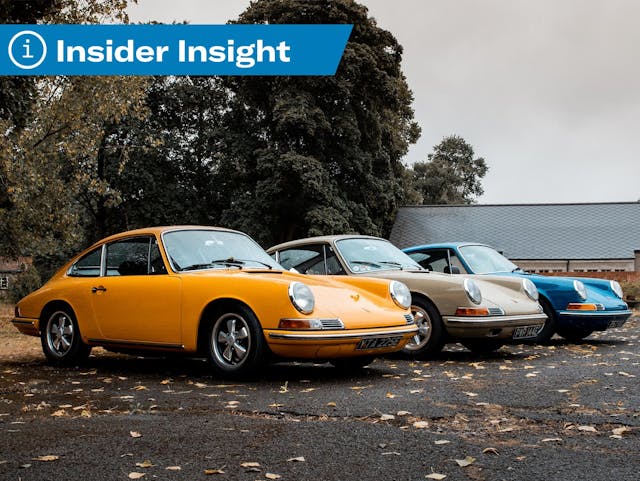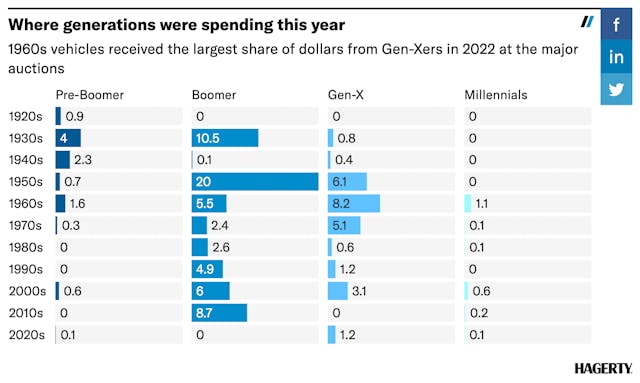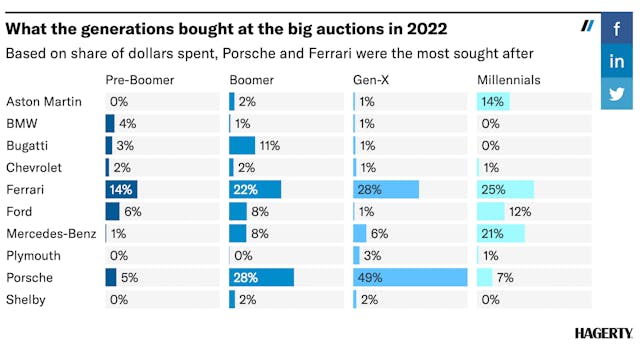Baby Boomers still dominate the in-person auction scene, but Gen-Xers are catching up

It’s been quite a year for big, in-person auctions. We recently looked at why we track the market for the most valuable cars, many of which headline these prestigious events. The value of sculpted metal is not all we observe at the Amelia, Monterey, and Scottsdale auctions, however. Identifying who is buying what at these auctions helps us understand the market outlook for similar but less valuable cars.
This article was originally posted on Hagerty Insider, our publication devoted to following the fast-moving collector car market. For a valuation deep dive delivered to your inbox every week, sign up for the Insider newsletter.
This effort requires a bit of detective work. The auction results are easy to compile, but the auction companies don’t say anything about the new owners. However, we can match the sold vehicle to a vehicle that gets added to a Hagerty policy after the auction. From there, we can begin to gain a more thorough understanding of buyer trends. Starting back in 2017, for those three auction events, we can compare each generation’s share of auction purchases.
As you’d expect, there’s a bit of variation from year to year. Yet there are clear trends: Baby Boomers (1946-1964) remain the primary bidders; pre-Boomers (1945 or earlier) are gradually receding from view; and Gen–X (1965–1981) participation is consistently growing, with nearly double their share from five years ago. Perhaps in another five years, they’ll make up a majority of the winning bidders at these auctions.
What are they buying?
We’ve said it before, and we’ll say it again: people don’t just collect the cars of their youth. That becomes clear when we look at what bidders from each generation brought home. For instance, at 2022’s major auctions, Baby Boomers spent more money on cars from the 2010s than on those from the 1960s. Millennials—a small share overall—showed a strong preference for the 1960s. Notably, vehicles of the 1980s were not on many bidders’ wish lists, with a 3.3 percent share for all generations; however, this also speaks to the fact that the longstanding in-person auctions have been slow, relative to their online peers, to offer these cars.

Drilling down on which marques various generations prefer, we can see that older collectors still can be big spenders—pre-Boomers went after Ferraris more than anything else. Boomers sought out Ferraris and Porsches, but Bugattis too. Gen-X likes Porsches even more, but Mercedes-Benz was the third favorite, and Millennials eschewed Porsche for Ferrari, Mercedes-Benz, but also Aston Martin, and Ford.

While these big auctions can seem otherworldly with bid increments sometimes exceeding the value of most “regular” enthusiast cars, we can still learn from them. The Boomer presence remains strong, if showing slight signs of reduced involvement. Gen-X’s share of the collector car market is increasing with every car they buy at these auctions, and they have a particular affinity for Porsches. Collectors across all generations have no problem buying cars older than themselves, and while each generation has its own top 10 marques, Ferrari and Porsche receive broad support.
Check out the Hagerty Media homepage so you don’t miss a single story, or better yet, bookmark it.


People aged 41-58 buying more vehicles has more to do with the career income curve and family demographics.
-children are usually grown up and done school at some point in this age range
-retirement (early for some) is on the horizon
-mortgages are often paid off or reasonable
-house downsizing can create cash
-long term hobbyists are more likely to be climbing the “prestige” ladder if they aren’t bogged down restoring a vehicle the auctions don’t care for
I suspect sorting this data into 5 year increments (maybe 10 year) would give a clearer picture than congregating 15-year spreads together.
I agree with Snailish.
But also more people are buying cars today because more can no longer work on them. With each age group the number of mechanically inclined declines.
The decline has to do with a number of reasons. One may be the complexity of cars today and the decline in easily restorable cars today. This is why the Air Cooled 911 market is raging.
Also I already own the cars of my gen. If I were to buy I would by older or new. The gen of the 70’s and 80’s have a limited number of options for real collector cars and most are difficult to restore because there are few parts for many and fewer junk yards to draw parts from.
Also I generally would avoid auctions. I rather buy a car where I can take the time to check it out, drive it and may have a history documented. Often these cars are even a better deal as you don’t have sone guy drinking all night bidding crazy numbers against you.
I’ve owned Porsche for 50 years, but this year I went back to my roots. I had a ’65 Beetle when I was drafted and bought a ’67 Beetle this year. I have an affinity for air cooled cars.
I agree with Snailish.
But also more people are buying cars today because more can no longer work on them. With each age group the number of mechanically inclined declines.
The decline has to do with a number of reasons. One may be the complexity of cars today and the decline in easily restorable cars today. This is why the Air Cooled 911 market is raging.
Also I already own the cars of my gen. If I were to buy I would by older or new. The gen of the 70’s and 80’s have a limited number of options for real collector cars and most are difficult to restore because there are few parts for many and fewer junk yards to draw parts from.
Also I generally would avoid auctions. I rather buy a car where I can take the time to check it out, drive it and may have a history documented. Often these cars are even a better deal as you don’t have sone guy drinking all night bidding crazy numbers against you.